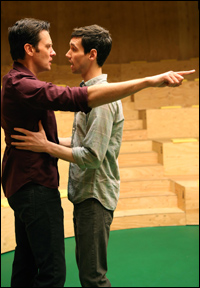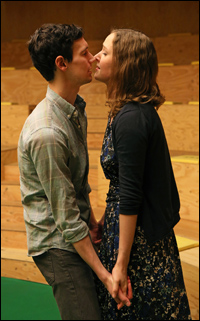
*
As directed by James Macdonald, who also staged the play's Olivier Award-winning 2009 London premiere at the Royal Court Theatre, the American premiere — currently scheduled through Oct. 7 at Off-Broadway's Duke on 42nd Street — stars Smith as John, the conflicted chap in the middle of longtime boyfriend M (Jason Butler Harner) and pretty new fling W (Amanda Quaid). Smith, who made his New York stage debut last year in The Shaggs at Playwrights Horizons, speaks about the extremely passionate, sometimes alarming audience reactions to his character's indefinable identity crisis.
What's it like to be in a play with a title that some major media outlets can't even say or print?
Cory Michael Smith: I enjoy it. I know our marketing team is pretty jazzed about that, because people think it's vulgar and edgy. I'm not a big jokester, but I can definitely appreciate people who can throw out puns left and right, so it's been fun to hear what people have been coming up with.
What were your initial impressions of John when you first read the script?
CMS: He keeps coming back to the idea of wanting to be honest. For better or worse, he's someone who says what he thinks. He's not afraid of feeling things, and he's not afraid of loving someone. He has this dichotomy of being fearless but also, once he sees his dilemma, very frazzled. He's just a very alive, responsive person, and that's a pretty thrilling thing to jump into as an actor.
| |
 |
|
| Jason Butler Harner and Cory Michael Smith in Cock. | ||
| photo by Joan Marcus |
CMS: John has an identity issue where he has absolutely no idea who he is. He talks about how different he feels with M and with W, and there's an exciting reality to that that's pretty alarming: One of the biggest insults you can say to someone is that they're two-faced, but different people do bring out different qualities in you. As I continue doing the play, it's thrilling to continue living in those two worlds and letting that confuse me. I've also enjoyed finding those times when John is being juvenile and when he's truly a mature adult. Sometimes we act like 13-year-olds, and other times we're able to make more composed, logical decisions.
Various reviews, many in reputable publications, have referred to John as a gay man who falls for a woman, but labeling John as gay seems inaccurate if not ignorant. How do you see him?
CMS: Honestly, it doesn't really matter to me. But I do find it really interesting that someone can come see this play and then venture to call him something, anything, because it's almost defying one of the major themes of the play. One of the lovely things about this piece is that Mike, the playwright, is confronting the complexity of human nature. So for me to place any kind of label on John does a disservice to what Mike has done and the freedom that his characters embody.
It's a natural for critics to try to boil a complicated play like Cock down to its simplest terms. Some have called it a play about bisexuality, but is it more about rejecting labels altogether?
CMS: That's a good question. Is it a play about rejecting labels? One of John's great explosions is when he's been cornered and goes into a diatribe about that, but I don't think that's necessarily the message of the play. For me, it's not about defying labels, and it's not about a promotion of bisexuality. The evolution of our consideration of sexuality and the idea of normality is different in different cultures. It's also always changing, which is so confusing but also so right. What's considered normal in New York City, for example, is not normal in various other parts of the country, and everyone must find their own level of comfort. So I think the play's more about asking why we try to figure these things out, why there has to be answer, why there has to be a right or a wrong, why should anyone tell someone else they have to know what they are. It doesn't matter.
| |
 |
|
| Cory Michael Smith and Amanda Quaid in Cock. | ||
| Photo by Joan Marcus |
CMS: Yeah, it's definitely a fight in that way. I hope that people are engaged enough to choose sides, because that's essentially what my character's doing in the play. It would be even more exciting if people switched teams at some point or came in with certain assumptions and then had them shift. I had a good friend explain to me which choice he preferred and why, and it was really based on the aggressive and challenging type of relationship that he consistently finds himself in. He's straight, but he was more naturally inclined to support John's relationship with M; it felt more real and familiar to him because it had more fighting. It was interesting to hear that. People always see reflections of their own relationships or what they want in a relationship.
The play is certainly one that incites debate among those who've seen the production. Do you allow yourself to get involved in those arguments?
CMS: I ignored them for a very long time, but at this point I find it interesting and fun, so I'm more open to it. It's usually women who will come up to me after the play and share their thoughts. Some people completely understand where John is at the end of the play, but other people find John manipulative, which I don't find at all. I hate when people think that, because I don't want them to find him manipulative. I don't take anything personally because it's so incredibly varied, and I find the opinions entirely reflect someone else's experience, whether it's their most recent or most pertinent relationship. When people get angry toward him, I imagine it's because they've been hurt by someone like him who was uncertain. Still, it's thrilling for me when someone has a personal reaction to the play. That kind of strong feeling is the greatest thing I can ask for.
Cock is performed in the round with the audience visibly lit and in close proximity to the actors. Does that ever become a distraction?
CMS: I love it. I tend to be an intense and focused person, so I don't get that distracted from it. Well, I did the first couple times, just because it's such an extreme environment, but I very quickly adapted. Frankly, I don't have time to get distracted. There are times I'll accidentally catch someone's reaction to something, and it's lovely. My favorites are the couples who'll look at each other with knowing looks, and I'll notice that some of them will get closer to each other as the play goes on. It's cool to see other people connecting to the play. Sometimes it feeds me, but I don't look much.
Audiences sometimes have very vocal reactions to the material, as if they're at a sporting event. How do you prepare for that as an actor?
CMS: It's funny you say that, because we recently had an extremely vocal audience, which was really strange. I don't think you can ever really prepare for that. Individual voices can be jarring, and it's surprising when people get really passionate like that, but it's fun when the audience becomes a team and decides on one personality like a collective animal. It's exciting when an audience feels that they can participate, and the lighting definitely helps; they feel like they can't hide anyway, so why not go wild? Your director, James Macdonald, also helmed Cock in London. What was it like to work with someone who had already directed the play to great acclaim with different actors — and actual Brits [the play's characters are British]?
CMS: To his credit, and I'm ever thankful, he did not mention the British production once during rehearsals. There were no expectations placed on us, which was great. As I was tackling the script, the last thing I wanted was to feel like I had to climb out of the shadow of Ben Whishaw, who played John in London and whom I love and think is so fantastic. I had some anxiety about that, but James didn't say a word about it. James is such a lovely, gentle man, and he created one of the greatest rehearsal environments I've experienced thus far.
| |
 |
|
| Smith in Cock. | ||
| photo by Joan Marcus |
What was the rehearsal process like? Cock seems like an instance where those collegiate trust- and chemistry-building exercises might have come in handy.
CMS: I totally know what you mean, but we didn't do any falling backward into each others' arms. James just made us all feel so comfortable with each other. James is incredibly economical in his direction; he's not someone who speaks often or a lot, so when he said something it was incredibly purposeful, efficient and personal. Because of that, there were a lot of moments where we were reading the script together, thinking independently, sharing when we wanted to, and just looking into each others' eyes. I know this sounds ridiculous, but there were so many times when we were just sitting in silence together. A group of people that can sit together quietly, comfortably, and only speak when necessary is like heaven to me.
What kind of work went into nailing your British accent?
CMS: We had a lovely voice coach come in, Kate Wilson, and she's wonderful. I also listened to a lot of different people from London. I just love dialects; they're really fun. One of the coolest ways to start building a character is the way he moves his mouth, what part of the mouth he puts his words into, how he expresses himself, and there's a certain flavor you get with a dialect. It's nice, because the play doesn't dictate exactly where the characters are from, so there's some leniency in that.
The play features no costume changes, no props, and no pantomime of stage business. What are the benefits of that?
CMS: That was actually Mike Bartlett's choice, because it's written in the play that there are no sets, no props and no miming. I don't believe it says anything about costumes, but I'm sure that was his intention as well. Put simply, it makes the people important. It's incredibly difficult and exciting, because there's nothing to hide behind and nothing to distract ourselves from the human being in front of us. It makes that person the most important thing at that moment.
Back to John, the play makes it clear that he is not your typical heartthrob or stud.
CM: [Laughs.] Nor am I.
So what makes him so darn attractive to two wildly disparate characters like M and W?
CMS: I don't know. God bless them. Clearly it's nothing physical. I think it goes back to his honesty, which is really endearing. At least that's why I love him. When someone's up-front with you, telling you who they are, telling you how they feel, not hiding their behavior, putting it all out on the table for you, saying what they do know and what they don't yet know… how can you not trust that person? There's something very attractive about that. Considering the play's controversial title, is it fair to assume that John's endowment and bedroom skills are also worth fighting over?
CMS: Yeah! [Laughs.] Yeah. He's a passionate person, a lover, so I would imagine that John would be a good time in the bedroom.
Regardless of their reasons, two people are ostensibly fighting over you every night. Does that go your head a little bit?
CMS: Oh, God, no. If anything, it makes me feel guilty. No, the play exhausts me, so I don't have time to let it go to my head.
W says to John, "Some people might think you were scrawny, but I think you're like a picture drawn with a pencil." That's a terrific backhanded compliment, isn't it?
CMS: Right? That's one of my favorite lines in the play. The first time I read that, I thought, 'If someone said that to me, I'd probably marry that person.' But the first time we did it in front of an audience, and then every time thereafter, it gets one of the biggest laughs in the show. I didn't expect people to laugh at that, because I think it's so lovely and beautiful. It's actually the best compliment I've ever gotten, except it's in a play and not in real life.











